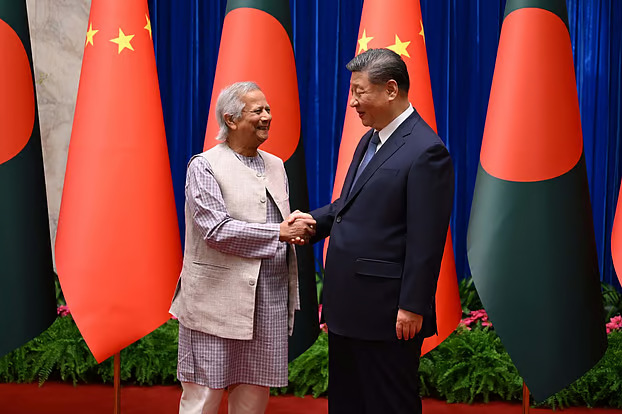Physical Address
304 North Cardinal St.
Dorchester Center, MA 02124
Physical Address
304 North Cardinal St.
Dorchester Center, MA 02124
Flood Prevention, River Dredging, and Tech Sharing Take Center Stage in New Agreement

Key Takeaways:
Bangladesh and China have agreed to significantly enhance their collaboration across several crucial areas, including hydrological forecasting, flood prevention, river management, and water resource development. This commitment was made public in a joint statement issued by Professor Muhammad Yunus, the Chief Adviser of Bangladesh’s interim government, and Chinese President Xi Jinping on Friday. The announcement follows Professor Yunus’s attendance at the Boao Forum for Asia (BFA) annual conference and a subsequent visit to Beijing at the invitation of the Chinese government.
During meetings in Beijing and Hainan, Professor Yunus engaged in in-depth discussions with President Xi Jinping and other high-ranking Chinese officials, including Vice Premier Ding Xuexiang and Vice President Han Zheng. These discussions, held in a friendly atmosphere, centered on strengthening bilateral ties, aligning development strategies, and addressing regional and international issues of mutual interest. Both sides reaffirmed their commitment to the principles of peaceful coexistence and emphasized their mutual support on core issues and major concerns.
China reiterated its policy of non-interference in Bangladesh’s internal affairs, respecting its independence and sovereignty, and supporting its chosen path of development. Bangladesh, in turn, reaffirmed its adherence to the One-China principle. The leaders also agreed to promote high-quality cooperation under the Belt and Road Initiative, strengthen supply chains, and work towards modernization in both countries.
Bangladesh expressed gratitude for China’s long-standing support for its economic and social development, highlighting the impact of Chinese-funded infrastructure projects. China pledged to continue this support, particularly in areas like textiles, clean energy, the digital economy, agriculture, and manufacturing, encouraging Chinese investment in Bangladesh. Key projects like the modernization of Mongla port and the development of the Chinese Economic and Industrial Zone in Chattogram were also discussed.
A significant focus of the discussions was on boosting trade relations. Both sides agreed to prioritize negotiations for a China-Bangladesh Free Trade Agreement and to optimize the existing investment agreement. Facilitating the early export of high-quality Bangladeshi products, such as fresh mangoes, to China was also a key point of agreement. Bangladesh welcomed Chinese participation in its economic development and reaffirmed its commitment to creating a favorable investment climate.
Furthermore, cooperation in water resource management took center stage, with agreements to collaborate on hydrological forecasting, flood prevention, river dredging, and technology sharing. The signing of an implementation plan for sharing hydrological data on the Yarlung Zanbo-Jamuna River was noted positively. Bangladesh also welcomed Chinese involvement in the Teesta River Comprehensive Management and Restoration Project.
Looking beyond immediate economic ties, both nations agreed to collaborate on tackling climate change, exploring the blue economy, and strengthening maritime exchanges. They also planned to jointly celebrate the 50th anniversary of diplomatic relations in 2025 with a year of people-to-people exchanges. Discussions also touched upon international issues, with both sides emphasizing the importance of multilateralism, the UN Charter, and addressing global challenges, including the situation of displaced people from Rakhine State in Myanmar. Several agreements were signed during the visit, covering economic and technical cooperation, cultural exchange, media cooperation, and the health sector.
Professor Yunus expressed his appreciation for the warm reception and invited Chinese leaders to visit Bangladesh. China acknowledged the progress made by Bangladesh’s interim government and reaffirmed the importance of their comprehensive strategic cooperative partnership.
[…] March 2025, During his state visit to China, Peking University conferred an honorary doctorate upon Professor Yunus, acknowledging his […]